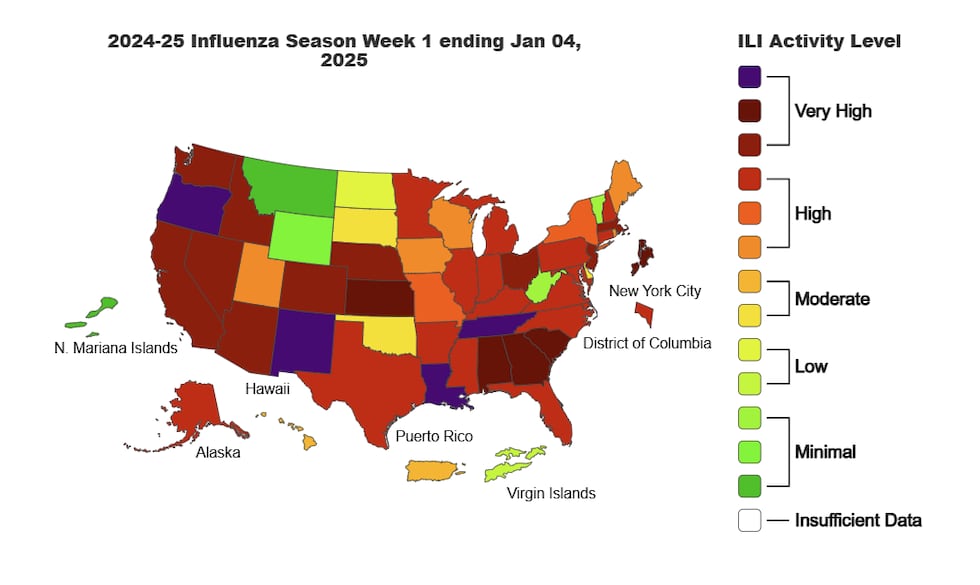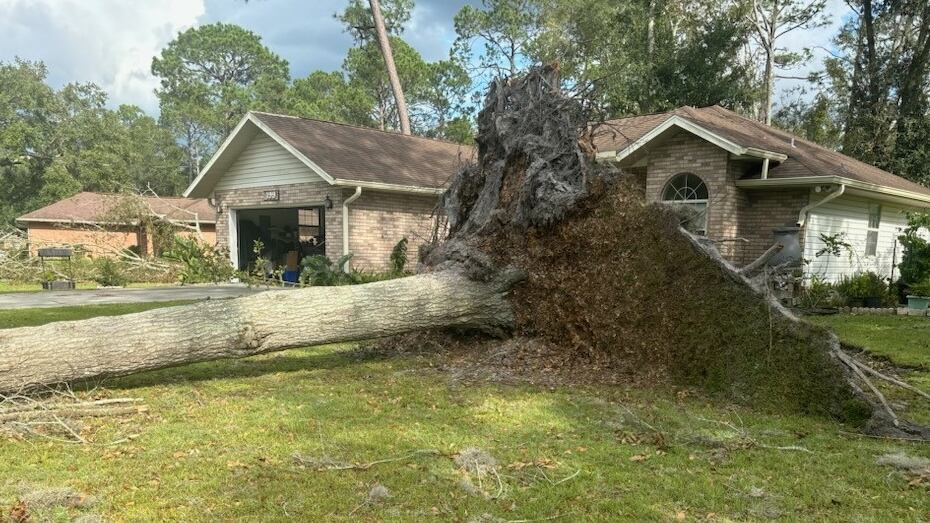What’s behind the wave of illnesses afflicting the CSRA?
AUGUSTA, Ga. (WRDW/WAGT) - In the winter months, it seems few are safe from some kind of illness — flu, COVID-19, norovirus, colds, and that’s definitely the case right now for Georgia and South Carolina.
Both states right now are close to the highest possible ratings for flu levels, according to the Centers for Disease Control and Prevention.
The CDC’s scale has 13 levels, ranging from minimal to very high. Georgia and South Carolina are both only one notch down from the highest level, according to the latest data available, which is from the week ending Jan. 4.

The CSRA is at the peak of the season for getting sick.
One local doctor says they’re seeing more people come to the hospital with multiple illnesses.
“Of the most feared viral infections, influenza is the one that’s increasing,” says Dr. Vazquez, Chief of the Infectious Disease Medical College of Georgia. “Probably about 20% of our testing is coming back positive for influenza.”
While many of the germs that cause this misery can circulate throughout the year, scientists think that the winter surge of flu and cold activity may be because we spend more time indoors and the cold, dry air may weaken our defenses.
Not to mention we’re just out of the holidays, when we spent lots of time around other people.
But knowing what these bugs are and how they spread can help. While it may be difficult to make it through the season totally unscathed, there are some things you can do to protect yourself from these respiratory and stomach viruses.
Meanwhile, one local school is shutting down for the rest of the week because so many teachers and students are getting sick.
Curtis Baptist School in Augusta says due to illness affecting more than 20% of its student body and staff, it will be closed on Thursday and Friday for deep cleaning.
Elementary, middle and high schoolers are affected by this.
How do I know what I’ve caught?
Some symptoms are hard to distinguish among illnesses, especially with respiratory viruses. Others are unmistakable.
- Norovirus is a foodborne illness that can spread through water and contaminated surfaces and can cause vomiting, diarrhea, nausea and stomach pain for about one to three days.
- The common cold can be caused by several different types of viruses and can cause a runny nose, congestion, cough, sneezing, sore throat, headaches, body aches or low fever for less than a week.
- The flu, caused by influenza viruses that are always changing, leads to fever, chills, cough, sore throat, runny nose, body aches, headaches and feeling tired. Flu symptoms tend to hit more quickly than cold symptoms, and can last anywhere from a few days to two weeks.
- COVID-19 can cause fever, chills, cough, short of breath, sore throat, congestion, loss of smell or taste, fatigue, aches, headache, nausea, or vomiting for several days.
- RSV can cause a runny nose, congestion, coughing, sneezing, wheezing, fever and a loss of appetite for a week or two.
HEALTH HELP
Symptoms: Is it a cold, the flu or COVID?
- COVID symptoms may include fever or chills, cough, body aches, headaches, tiredness, shortness of breath and loss of taste or smell.
- Centers for Disease Control and Prevention experts say a sore throat, sneezing, itchy or watery eyes, and a running or stuffy nose are less common with COVID-19.
- Someone with the flu may experience all these ailments, but the loss of taste or smell is more frequent with COVID-19.
- When it comes to colds, fever or chills are not common, but you may have a cough, body aches, tiredness, be sneezing or have a runny or stuffy nose.
- In winter months, even allergies can act up, but generally that will not cause fever or chills, body aches or a loss of taste or smell.
Dr. Vasquez says you should see someone if you have had a high fever for more than 48 hours, chest pain, a repeated cough, severe headaches and muscle pains.
“It is kind of a fine line between the colds, which are a little milder versus, I would say at 48 hours,” says Vazquez. “If you’re not getting better and have a really high fever and feeling really bad then you probably should get seen urgently. Or better yet, your primary care doctor.”
One way to protect yourself from all viruses: Wash your hands
Seriously. Rigorous and frequent handwashing — with soap! — is crucial to reduce the spread of norovirus, colds, flu and COVID-19.
This is especially true after using the bathroom and eating or preparing food, the U.S. Centers for Disease Control and Prevention says.
Don’t speed through it, either. Count to 20, slowly, while you scrub away.
If you don’t have access to soap and water, try a hand sanitizer with at least 60% alcohol — though that isn’t enough to wipe out norovirus.
Opening date revealed for new FreshTake supermarket – and it’s days away
An opening date is in sight for the long-awaited FreshTake grocery store on Washington Road in a former Whole Foods location.

Cleaning surfaces can wipe out viruses
If norovirus has found you, you’ll want to immediately clean surfaces that came in with contaminated food or bodily fluids. The CDC recommends disinfecting things with a chlorine bleach solution or one of the products listed on this Environmental Protection Agency website.
Don’t forget to wash any clothing that came in with vomit or feces — use hot water and detergent. Then, wash your hands. Again.
With colds and flu, it’s best to regularly clean surfaces that you come into a lot of with. Think doorknobs, light switches, countertops, beloved toys, cellphones.
Use household cleaning products that contain soap or detergent, and follow it up with a sanitizer. The CDC has more tips on how to clean.
COVID-19 generally spreads through the air from droplets and particles, and the CDC says the risk of getting the virus from a contaminated surface is low.
How Hurricane Helene could actually help with your taxes
Destroyed and damaged homes can lower a property’s value until they’re rebuilt or repaired. That’s why homeowners should report any damage.

Keeping your hands off your face can keep viruses out
Viruses can spread through talking, coughing and sneezing, so cover your mouth with a tissue if you feel a tickle in your throat or your nose. Then, wash your hands. Again.
Also, even if you’re not sick, consider masking in crowded areas with an N95 or medical-grade mask to protect yourself from respiratory viruses.
Don’t touch your face: If you have a germ or virus on your unwashed hands — respiratory or norovirus — and touch your face, eyes or nose, it can get into your mucus membranes and, voila!, you’re sick!
Gas prices rise, but Ga. and S.C. are below the national average
Prices at the gas pump continue to creep upward as sanctions continue to limit the worldwide oil supply.

Consider a vaccine (if there is one)
Updated COVID-19 vaccines are available, as well as annual flu shots for people 6 months and older. For those 60 and older or for people who are pregnant, you may want to get the RSV vaccine.
But there is no vaccine for norovirus or the common cold.
Dr. Vazquez says it’s not just the common cold and flu that’s going around, there’s an increase in RSV, and a gradual increase in COVID too. He says another reason is because of low vaccination rates across the country.
“All three of those coming together means an increase in hospitalization visits,” says Vazquez. “Increase in ER visits and in patients that get it. There’s also an increase in issions into the hospital.”
Another way to keep your defenses against viruses up: Rest
Your immune system may not work as well if you’re sleep-deprived, stressed out or dehydrated. So don’t grind yourself into the ground if you can help it. Rest. Sleep. Drink water.
If you are sick, stay at home
If you do get sick, prompt testing can help determine whether you have COVID-19 or influenza. That’s important to see if you need one of the medicines that can help prevent severe illness: Paxlovid for COVID-19 and Tamiflu for flu.
Above all, if you’re symptomatic, stay at home to keep from getting others sick.
To treat a cold, flu or COVID-19, rest and drink fluids. You can take pain relievers to lower a fever or help with an achy body. Humidifiers can help with symptoms, too.
There’s no medication for norovirus. Instead, you’ll need to rehydrate as much as possible with water and other liquids. Seek help if you are dehydrated and notice you have a dry mouth and throat, aren’t urinating as much or feel dizzy when you’re standing up.
Aside from hydration and rest, doctors also recommend taking vitamin C and zinc to help the recovery process.
Copyright 2025 WRDW/WAGT. All rights reserved.














